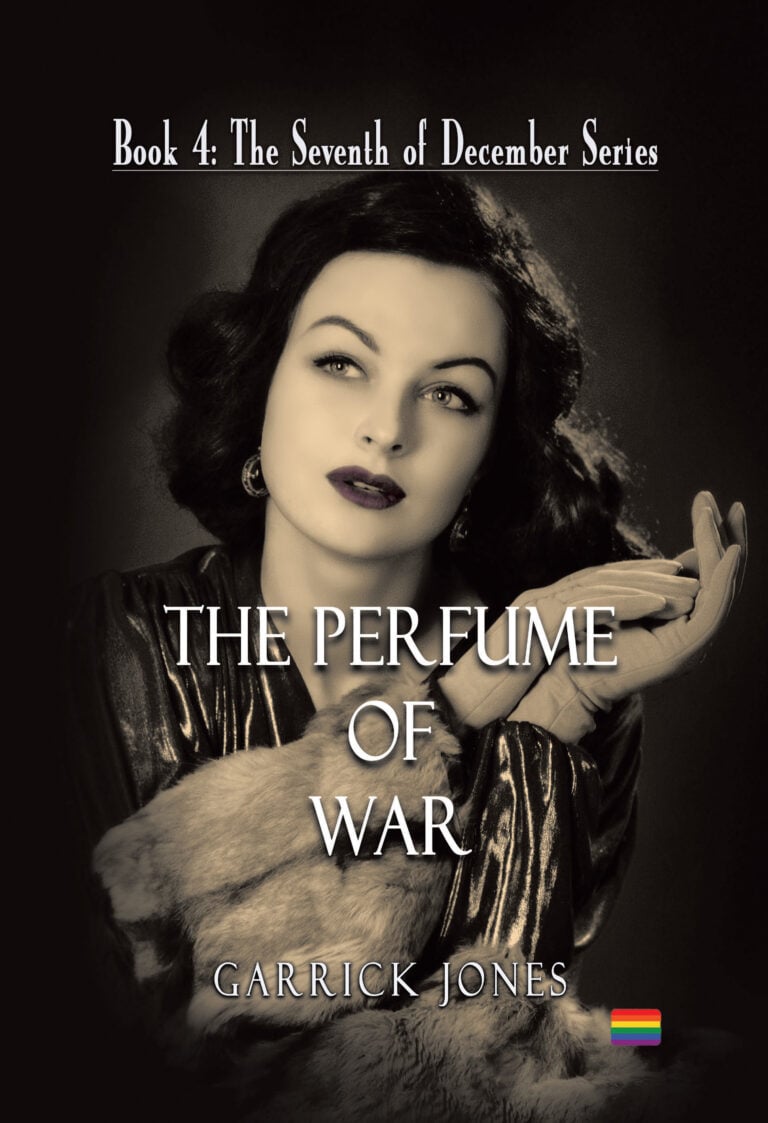An Australian concert violinist now employed on the clandestine side of the British war effort, Sir Tommy Haupner lives a stressful life. On top of that, he’s gay. Though embedded in a network of supportive friends who know and love him, the fact always adds an extra level of threat to his interactions. When Tommy is picked for a sensitive mission to the Duke of Windsor, he begins to spin a web of trans-Atlantic connections with strands across Europe—and even back into Germany itself.
The fourth book in Garrick Jones’s Seventh of December series, THE PERFUME OF WAR isn’t Sir Tommy’s first adventure. As such, there’s an established network of “the lavender set” engaged in clandestine operations, and THE PERFUME OF WAR doesn’t need to spend time laboriously establishing its characters or setting from scratch. It can therefore focus more effectively on its real interests: the persistence of humanity in wartime, enlivened with snippets of scenic detail. The reality of human desire does not go away while nations are at war, and this novel derives some appealing complexity from international relationships formed during peacetime, which are strained but often hold true during the war. This complexity extends to most of the characters and their backstories. The main cast (like real-life intelligence organizations) is studded with multicultural polyglots who showcase some of the cross-cultural connections that existed before (and persisted through) the Second World War. Tommy himself is an Australian with German relations, and he even suffers some discrimination as a “colonial” rather than a “real” Briton. Interactions like these showcase the surprising diversity of experience, which existed even within the armed forces of a single nation. THE PERFUME OF WAR is often at its best when it highlights these experiences. For instance, when Tommy plays a concert in Switzerland and enjoys an affectionate German-language conversation with his old violin teacher, or when he has a candid night-time conversation with a highly placed American official about living with his sexuality at the FBI.
While its position as the fourth in a series allows THE PERFUME OF WAR to focus on its core thematic competencies, it is notably weak on plot. It takes about the first third of the text to kick into gear, and even from here onward, a few scenes of crackling action (including a tense, crisp scene in which Tommy confronts the Duke of Windsor) are buoyed on an ocean of quotidian interactions. To a degree, this is probably verisimilitude: there are lots of office meetings, phone calls, and paperwork; and, when on tour, there is a lot of rehearsing, handshaking, and dining. Both of these are certainly real components of intelligence work, but the book can tend to get lost by rehashing these interactions without always tying them to the plot or using them to meaningfully develop character.
There is clearly an overarching plot which continues to develop across the series, but THE PERFUME OF WAR doesn’t feel like it succeeds as a stand-alone novel while advancing those larger plot threads. A lot of time is spent handwaving relationships that were established in such-and-such previous adventure, which leaves some characters feeling thin. Consequently, scenes can lack emotional impact, since they aren’t particularly meaningful to the reader within this text itself. Most frustratingly, the ultimate villain of the book is a person who clearly had prior entanglements with the protagonists but barely appears at all. The character is baffling, and the scene unfulfilling, for anyone just joining in for this installment. Meanwhile, some loose ends—a rising London gangster and a few references to Nazi occult research—take up time and space just to set up future installments.
A slightly different structure, with greater focus on these storytelling fundamentals, would notably improve THE PERFUME OF WAR. Nevertheless, it remains an entertaining and occasionally moving depiction of a gay intelligence officer in WWII Britain.
Garrick Jones’s THE PERFUME OF WAR has a fun premise, some interesting historic detail, and a few brisk action scenes for a story that works best when read after its predecessors in the series.
~Dan Accardi for IndieReader


